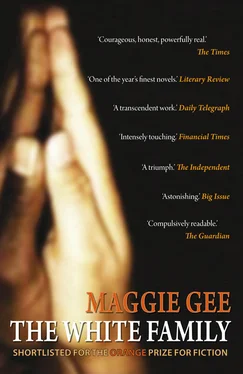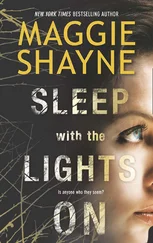I suppose this was written to hold us all together. Which is why we come here; to be together. We could pray, after all, on our own at home. But heaven could never be lots of separate houses.
Shirley had always liked the priest. The Reverend Stewart had a sense of humour. He was passionate and honest, he was big and handsome with thick silver hair, and Kojo had liked him. He was kind to her when Kojo died.
Today, though, her mind wandered during the sermon. He was talking about the City of God. She was stroking Elroy’s hand, tracing the veins, the tree of blood underneath the skin.
Suddenly she felt from the tension in Elroy that he was listening in a different way. The Reverend Stewart was leaning forward, raising his voice, thundering: ‘… recent bloody acts … disgraceful blot upon our city … These poor young people, pointlessly murdered … White and black is just a matter of skin … Remember the speech that Shakespeare gave to Shylock, the Jew, addressing Christians. “If you prick me, do I not bleed?”’
Shirley grimaced at Elroy, helpless. There had been a lot of killings in the last six months. The guilt she felt was always wretched and total: My people are killing your people.
Now she longed for this church service to be over, so the two of them could leave with their arms around each other, so she could be close to him, show him she cared.
She tried to concentrate on the sermon again. ‘My image today is the Heavenly City. The image of a sacred place on a hill. This longing runs through so much religious writing. Sometimes it seems to be a paradise lost, a place to which we shall one day return. Sometimes it’s the Garden of Eden … and the English love their gardens, don’t they? I often feel it’s our most attractive trait … The way towards the city is a pilgrimage, for Christians. We see it as a light in the future, stopping us from getting lost, drawing us onwards. Perhaps we are only meant to find that city after we die, but I don’t believe so, do you? I think that Christians should be building it here. I think we can build the good place in our lives. I think we can build the city for others. I hope we are trying to build heaven on earth …’ His voice was clear, carrying, triumphant, lifting his people, lifting them up — ‘But when I read about this senseless violence. When I read about white killing black, I know how many miles we still have to go … I ask you to join with me in prayers today for all black people living in Britain.’
What a shame, Shirley thought, nearly all of us are white.
The church was very quiet after he stopped speaking. Now there was a time for silent prayer.
Shirley didn’t kneel because her knees were unforgiving, she always sat with her head in her hands, and as she sat there staring at the cage of her fingers, the dark pink bars of her crossed fingers, Elroy reached out and took her right hand, peeled it away from the face it was protecting, pressed it to his lips, then held it tight, saying to her as clearly as he could, I love you, Shirley, it doesn’t matter. Nothing can stop us being together. She looked across and smiled at him, then covered her face with the remaining hand.
The words came into her head, unchosen, slipped into her head like a patch of bright silk — Bring us all to the golden city.
At the end of the service, there were always announcements, and as person after person came up to the front and (with varying skill at the microphone) told the congregation about a workshop on ‘God and autogenic training’, or a seminar on Creation Chanting, or a Circle for Christian Cookery, Shirley’s attention began to wander. The Reverend Stewart had bouts of coughing that Shirley suspected were not accidental.
It was after one o’clock when they finally spilled out of the church into the bright Sunday sunlight. The Reverend Stewart stood at the door, smiling at people and shaking hands. He greeted them particularly warmly. He seemed about to talk to Elroy, but a middle-aged woman with two straight plaits and a semi-transparent cheesecloth dress came bustling up and began to pour out a torrent of impassioned speech, before which he visibly flinched for a second, then returned to vertical, smiling staunchly, trying to keep his flock on the road, trying to keep their eyes on essentials.
It was dazzling after the dark of the church. The sky was the heavenly new blue of spring. It soared above the black vale of Piccadilly, to the bottom of which the sun could not reach, though people’s heads and shoulders were up in the sunlight. The bright glass and metal of the passing cars pushing on down the deep straight gully made her think, suddenly, of knives.
‘It’s good that he talked about the killings,’ she said.
‘Maybe. Yes. I don’t want to dwell on it.’
So Shirley walked along, worrying her worries, and Elroy withdrew into himself. And the congregation, the three hundred or so souls who had stood so close and embraced each other and prayed together for the City of God, trickled away into the crowds of Piccadilly, leaked away through the veins of the city, the real city, grey and dirty, thinning out, becoming lonely, threes and twos and single people, losing touch for another week, fading away into dryness, numbness, the never-ending chatter of electronic noise, the dust and heat of the underground. Because the embraces, the handshakes, the greetings, were never quite long enough to stick, never quite deep enough to bind them together. For the British were shy, and solitary, and did not want to embarrass each other –
The two of them wandered on down Piccadilly. They had five hours before the service at Elroy’s church in the afternoon. Outside the great arches of the Royal Academy where crossed red flags saluted the day, little cliques of greyhound-legged women in hats and cheery-looking men in dark suits and ties hallooed above the traffic in fluting voices.
Elroy said, ‘I went to an art gallery one time. I was curious, right. The Tate, I think it is, the one by the river —’
‘That’s nice. I don’t think I’ve ever been there. Did you like it?’
‘Nice pictures. And you don’t have to pay. But — I never see any of the brethren all day. Except a few in uniform, working as attendants, and one or two women in the canteen.’
‘Oh,’ said Shirley. She wished she hadn’t asked.
‘And the British Library,’ Elroy mused. ‘One time I do some research on nineteenth-century hospitals. Beautiful place. Very quiet, very peaceful. But most of them sitting there studying is white.’
‘I’m sorry, Elroy. But I’ve never been there — I don’t suppose they’d let me in.’
‘When we raise kids, it will be different for them. God does not despise His captive people. He rebuild the cities of Judah, Shirley, and the children of His servants will inherit it all.’
‘Are you still so sure that we shall have kids?’ Shirley stared at a bus, ploughing forward through the traffic towards them.
‘Of course we raise kids. Long as we have faith. What if I make you pregnant last night?’
Briefly, Shirley’s heart lifted with hope. Then they were plunged into the shadow of the bus, and the sound of the engine drowned their voices.
When it passed, Elroy was talking about his brother. ‘I got to have another talk to Winston. Time that boy is settling down. Mum’s only got one grandchild from us four kids.’
‘He’s busy studying,’ said Shirley. ‘Not a good time to have a baby. When I was studying —’ Then she pulled up. She had never told Elroy about her daughter.
‘Winston’s twenty, and he don’t have a girlfriend.’
‘Doesn’t,’ said Shirley automatically.
‘No good for a man not to have no woman.’
‘Well maybe that’s not what he’s looking for.’ Yesterday’s film had made Shirley even more certain of the thing that she had half-guessed at before — Why were the family so blind about it? His mother always talked about Winston getting married.
Читать дальше












